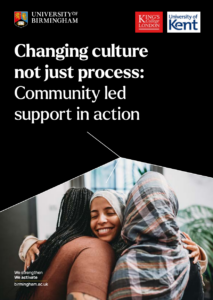Strengths-based principles, which emphasise that social care should focus on what matters to people and communities and build on their existing networks and resources, are widely supported across the sector and most importantly by many people and their families. Despite this and the potential of strengths-based approaches to transform practice and policy, there has been little evidence on its actual impacts and how the principles can be best embedded in social care processes and ways of working.
A two year study led by the University of Birmingham, King’s College London, and University of Kent as part of the NIHR National Priority Programme for Adult Social Care & Social Work, has been investigating the embedding and impacts of strengths-based practice though the Community Led Support (CLS) programme. CLS was developed by the National Development Team for Inclusion to take a systems-wide approach to strengths-based working and has been implemented in over thirty local authorities across the UK.
Findings from the study are now available – they suggest that CLS led to positive impacts on social care assessment and care management activities in comparison to non-CLS areas and highlight the contribution of community-based health and social care hubs, national learning networks, and the NDTI programme team’s role in turning strengths-based principles into social care practice. The study also identified opportunities to further develop the CLS approach in relation to co-production with people and communities, distributing leadership, and involvement of the voluntary and community sector. The full report can be read at: https://arc-kss.nihr.ac.uk/resource-library/545-changing-culture-not-just-process-community-led-support-in-action/file

The next stage of the collaboration with NDTI will explore how to develop new support and resources to better embed culture changes relating to strengths-based practice, and this will include a series of animations sharing the key insights from the research to date. The first of these animations can be watched online: https://youtu.be/EXUbxEtomBI. The next phase of the project will also focus on the role, implementation and collaboration involved in creating the CLS community spaces activity.
For more details of the project, please contact Robin Miller (ARC WM) r.s.miller@bham.ac.uk, Chloe Waterman (ARC South London) chloe.waterman@kcl.ac.uk, Caroline Jackson (ARC WM) c.jackson.7@bham.ac.uk, or Madalina Toma (ARC Kent, Surrey & Sussex) m.toma@kent.ac.uk.
More details of the Community Led Support programme can be found here: Community Led Support – NDTi
